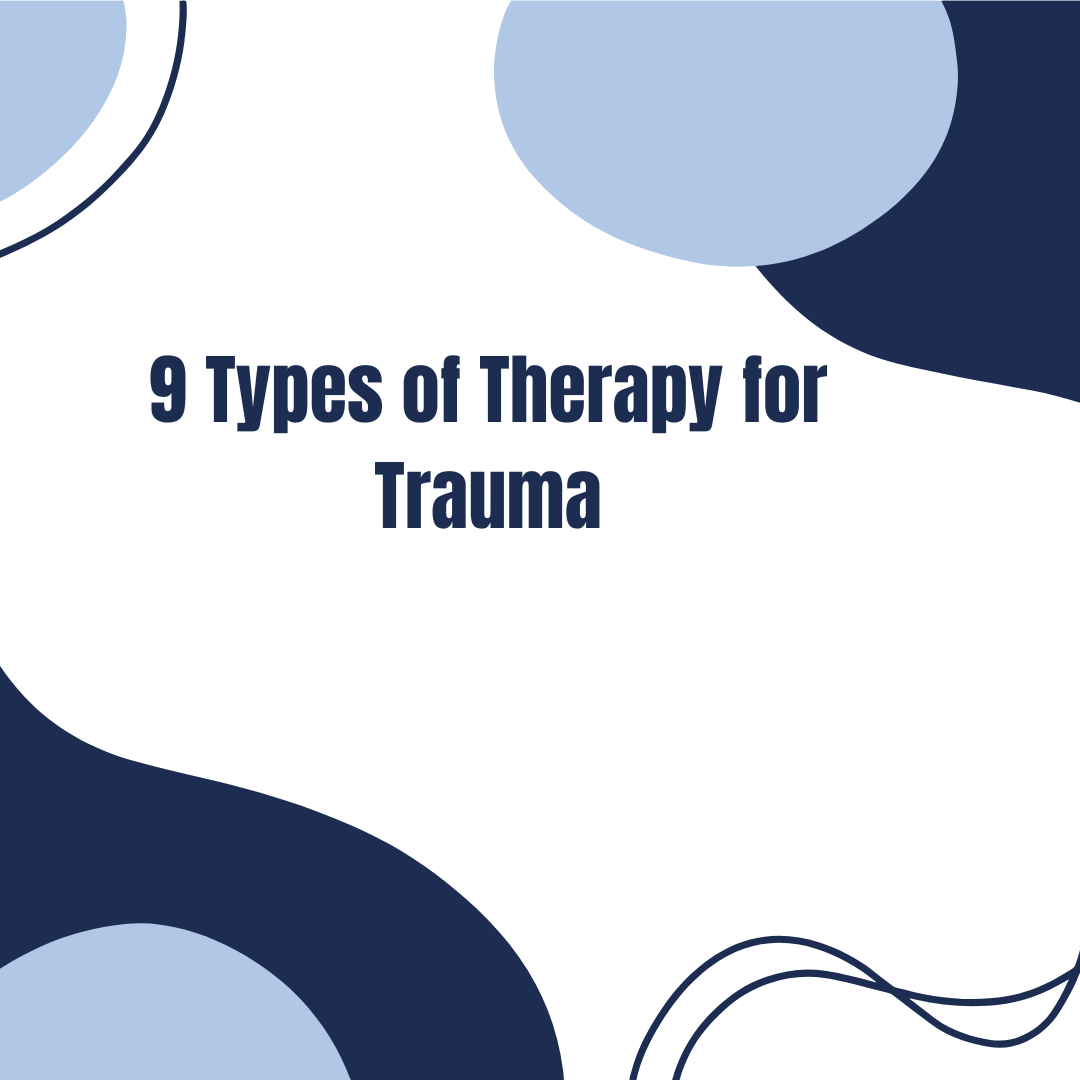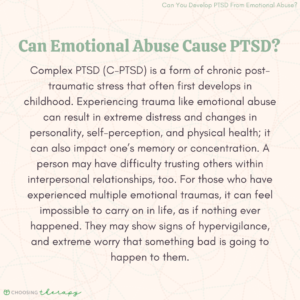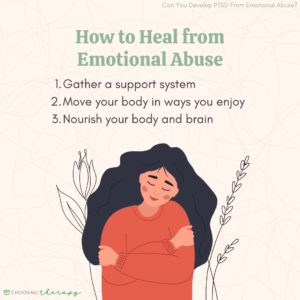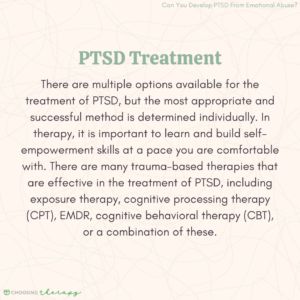Emotional abuse involves the use of someone’s emotions against them by evoking shame, guilt, humiliation, and similar negative feelings. The emotional and psychological trauma of any kind of abuse can cause long-term effects including PTSD (post-traumatic stress disorder), in the form of complex PTSD (C-PTSD). It can take a person months or years to process complex PTSD, but learning to cope and heal is possible.
Online Therapy For PTSD Therapy can help you live a better life. BetterHelp provides convenient and affordable online therapy, starting at $65 per week. Take a Free Online Assessment and get matched with the right therapist for you!
What Is PTSD?
Post-traumatic stress disorder or PTSD is a mental health condition that can develop as a direct result of exposure to a stressful, traumatic, or life-threatening situation. According to the Diagnostic and Statistical Manual of Mental Health Disorders (DSM-5), different types of PTSD can develop in a person who has experienced trauma themselves, or in those who witnessed the trauma or dangerous situation.1
“Trauma” is a broad term that can include physical, psychological, sexual, or emotional harm that is distressing for those involved. While reacting emotionally to an extreme life event is normal, someone with PTSD often experiences certain intense and persistent symptoms.1
PTSD Symptoms
Symptoms of PTSD can be immediate or delayed, sometimes by days, months, or even years.1 A PTSD diagnosis includes a number of associated symptoms. Individuals may exhibit a few or several of the common warning signs, depending on their personal response to the trauma. Our brains and bodies have natural defense mechanisms that are activated when we sense distress (including extreme emotions), danger, or any threat to our survival.
Symptoms of PTSD including the following:1
- Experiencing intrusive, unwanted thoughts relating to the trauma
- Replaying the events of the trauma or abuse
- Hypervigilance or sensitivity to actual or perceived threats
- Avoidance of reminders of the abuse or traumatic event
- Changes in behavior or mood
- Dissociative reactions, or losing the awareness of reality
- Forgetting or blocking out certain details of the event(s)
- Negative beliefs about one’s self or the world following exposure to trauma
- Negative feelings including guilt, shame, misplaced responsibility, or intense fear
- Loss of interest in normal pleasures, including detachment from others and things
- Increase in irritability or reckless behavior
- Difficulty getting enough sleep or sleeping too much
What Is Emotional Abuse?
Emotional abuse is a nonphysical behavior or attitude used to gain power and control over an intended target by inflicting emotional wounds or injuries.2 Emotional abuse may be difficult to recognize, especially when it involves manipulation. It can be overt, such as a person verbally lashing out. However, some abusers will strategically use another’s emotions against them in less obvious ways.
Emotional abuse often occurs on more than one occasion, and can extend over long periods of time. This form of abuse can appear in any kind of relationship, including romantic, familial, friendship, or professional. Abusers use emotions to induce fear or humiliation via verbal assault, forced isolation, ridicule, or degradation.2 It is important to note that an emotional abuser will often do so as a way to project their own feelings, or simply maintain control over another.
Common emotional abuse tactics may include the following behaviors:
- Withholding attention, love, or affection; or threatening to do so until the target meets their demands
- Frequent and extreme criticism
- Gaslighting, or manipulating one’s understanding of reality
- Name-calling
- Threatening to hurt or sabotage others
- Belittling words or behaviors
- Blackmailing, and threatening harm or consequences
- Encouraging the target to give everything up for them (the abuser) or their relationship
- Disregard for personal boundaries
Narcissism and Emotional Abuse
The presence of narcissism in a relationship can have a severe impact on one’s emotional well-being, whether the narcissist be a parent, partner, or friend. Narcissistic abuse is the use of psychological or emotional abuse to hurt or belittle someone. A narcissist will often enjoy the process of breaking another person down. Some emotional abusers may feel remorse for their behavior and apologize. More extreme abusers, like a narcissist, are simply unable to feel empathy for others, and are unlikely to be apologetic.3
Some common forms of narcissistic emotional abuse include:
- Criticism
- Name-calling
- Trying to dictate someone else’s feelings
- Invalidation
- Using intimate knowledge about a person against them
Just because someone is emotionally abusive, they are not automatically a bonafide narcissist. However, a narcissist is typically emotionally abusive, and will demonstrate many other high-conflict behaviors. It may be difficult to truly determine if someone is a narcissist or not; but, if their behavior is in any way abusive, a diagnosis of narcissism will not make it excusable or acceptable. Your mental health, physical well-being, and sanity should be your top priority.
Help For Trauma / PTSD Talk Therapy – Get help recovering from trauma from a licensed therapist. Betterhelp offers online therapy starting at $60 per week. Free Assessment Online PTSD treatment – Talkiatry offers personalized care from psychiatrists who listen and take insurance. Get matched with a specialist in just 15 minutes. Take our assessment
Can Emotional Abuse Cause PTSD?
Emotional abuse can lead to emotional scarring, which can take a person time to process and move on from. Complex PTSD (C-PTSD) is a form of chronic post-traumatic stress that often first develops in childhood. Experiencing trauma can result in extreme distress, and changes in personality, self-perception, and physical health; it can also impact one’s memory or concentration. A person may have difficulty trusting others within interpersonal relationships, too.4 For those who have experienced multiple emotional traumas, it can feel impossible to carry on in life, as if nothing ever happened. They may show signs of hypervigilance, and extreme worry that something bad is going to happen to them.
When people are emotionally abused by those who are supposed to love them, it is common for them to experience self-doubt and low self-esteem. While some emotional abusers may apologize and make reasonable efforts to remedy the situation, this is not always the case.3 Either way, abuse survivors should focus on healing and not on nurturing the feelings of the abuser. It is completely up to the emotional abuse survivor to decide if, when, and under what terms they would consider resuming any type of contact with the abuser. It is impossible to simply forget the pain or abuse; reminders of that abuse can be triggering, and require coping skills to overcome.
Effects of Emotional Abuse
Regardless if one’s traumas result in diagnosable PTSD, emotional abuse has significant impacts on one’s life. People who have been emotionally abused may show changes in behavior, personality, and mood. This can impact their ability to work, or take care of themselves and loved ones. Everyone’s response to abuse will be different. But, some common identifiable features of post-traumatic stress are visible within one’s mental and/or physical functioning, as well as within their relationships.
Mental Health
Whether it be short-lived or chronic, emotional abuse will impact a person’s mental wellbeing. They may start to feel confused, paranoid, or worried, and show symptoms of depression and/or anxiety. Some internal reactions to abuse may lead one to avoid or numb their feelings, especially when those feelings have been invalidated and undermined.4 Some people who have experienced emotional abuse may become so frustrated and distressed that they lash out when they feel threatened.4
Physical Health
The brain and body can also be severely impacted by prolonged emotional abuse. Stress can directly negatively affect one’s cardiovascular health, weight, and hormone balance, or induce chronic pain.5,6 Additionally, many studies have cited a correlation between emotional abuse and certain comorbid physical and mental health conditions, such as obsessive compulsive disorders, eating disorders, and autoimmune disorders.7,8
Interpersonal Relationships
Individuals who have been impacted by emotional abuse may face difficulty in several, if not all of their interpersonal relationships. It is common for abuse victims to struggle with trusting or believing what others say, and/or feel indifferent or avoidant of or dependent on others. They may also focus too much on reading others’ facial expressions or body language.2,3,7,9 These behaviors may be results of negative cognitions or thoughts about relationships in general, but can be reworked and adapted.
Future Relationships
The emotional scars of abuse can transfer into new relationships as well. It is normal and healthy to approach new relationships slowly and cautiously in order to protect oneself. However, it can be difficult to balance self-preservation with paranoia, leading someone to make negative assumptions and behave fearfully. For emotional abuse victims, they may question the true and good intentions of others, because of the damaging and confusing nature of their abuse.
Some people who have experienced emotional abuse might think that mistreatment is the only way they deserve or should expect to be treated, and then they might accept further emotional abuse in many of their relationships because they do not know what a “normal” relationship should look like. They can be attractive to narcissists who look for people to walk all over.
How to Heal From Emotional Abuse
Trauma recovery is not an easy journey. But, it is possible to adopt new skills and ways to heal from abuse. You may not completely forget about your experiences, but you can learn from them and rebuild your sense of trust in yourself and others.
Gather a Support System
Having a support system–be it in healthy relationships with a partner, friend, family member, or therapist–will likely boost your sense of healing and recovery. Talking about the abuse and trauma can be triggering and unhelpful at times, but learning to simply enjoy life again can be successful in itself. Additionally, making new friends and learning to set healthy boundaries can feel corrective in a sense, and allow you to take some control back in your life.
Move Your Body in Ways You Enjoy
Being in touch with your body’s needs and desires is a great way to overcome the confusion that emotional abuse can cause. It is common for someone to feel disconnected from themselves after abuse, as if they don’t recognize themselves anymore. Living mindfully, or free of judgment, can include learning to listen to your body when it needs rest; physical activity; or some other type of stimulation. If your body doesn’t feel right, try not to push yourself. Instead, explore and identify what you are experiencing and why.
Nourish Your Body and Brain
Being mindful of how you treat your body and brain requires strength and discipline, as it can be tough to be kind to ourselves sometimes. Nourishment for your body and brain may include things like exercise and healthy eating habits. Or, it could involve getting more rest, and allowing yourself time to process and decompress after triggering or upsetting experiences.
When to Get Professional Help
Finding the right therapist after emotional abuse can be extremely helpful. If you or a loved one are experiencing severe symptoms of PTSD or other mental health conditions, consulting with a therapist to determine if treatment would be helpful is a good idea. Locating a professional who is experienced and well-versed with the effects of emotional abuse, including the mental and physical warning signs, is important. It may take a long time to feel like you have processed the abuse, and there is never a wrong time to start or get back into therapy again.
PTSD Treatment
There are multiple options available for the treatment of PTSD, but the most appropriate and successful method is determined individually. In therapy, it is important to learn and build self-empowerment skills at a pace you are comfortable with. There are many trauma-based therapies that are effective in the treatment of PTSD including exposure therapy, cognitive processing therapy (CPT), EMDR, cognitive behavioral therapy (CBT), or a combination of these.
For many people, talking about the abuse is tiring, and talking isn’t helpful for everyone. If this is the case for you, treatments such as eye movement desensitization and reprocessing therapy (EMDR) do not require discussion of your experiences. Rather, this therapy focuses on reworking one’s associations with their abuse. Other therapies like cognitive processing therapy (CPT) and cognitive behavioral therapy (CBT) work to change unhelpful thought patterns; CPT is specifically trauma-centered and a derivative of CBT.
Final Thoughts
Trauma and abuse recovery is challenging, but healing and coping is possible. Finding a therapist who is the right fit for you and your personality will be helpful in your recovery journey. However, regaining confidence and hope in yourself is most important. It is true that there is no quick and easy way to move forward after abuse. But, learning skills to reduce stress will allow you to find healing on your own terms.
Additional Resources
To help our readers take the next step in their mental health journey, Choosing Therapy has partnered with leaders in mental health and wellness. Choosing Therapy is compensated for marketing by the companies included below.
Online Therapy
BetterHelp – Get support and guidance from a licensed therapist. BetterHelp has over 25,000 therapists who provide convenient and affordable online therapy. Take A Free Online Assessment and get matched with the right therapist for you. Free Assessment
Online PTSD treatment
Talkiatry offers personalized care from psychiatrists who listen and take insurance. Get matched with a specialist in just 15 minutes. Take our assessment.
Treatment For Trauma & OCD
Half of people diagnosed with OCD have experienced a traumatic life event. The chronic exposure to stressful situations, such as ongoing bullying, or an abusive relationship can lead to the development of OCD symptoms. NOCD therapists specialize in treating both trauma and OCD and are in-network with many insurance plans. Visit NOCD
Trauma & Abuse Newsletter
A free newsletter for those impacted by trauma or abuse. Get encouragement, helpful tips, and the latest information. Sign Up
Choosing Therapy Directory
You can search for therapists by specialty, experience, insurance, or price, and location. Find a therapist today.
How Does ERP Help With Intrusive Thoughts? Obsessive compulsive disorder (OCD) is a psychiatric condition marked by the presence of obsessive thoughts, images, doubts, or urges, followed by compulsive behaviors or acts aimed at easing the distress caused by the obsession. While the content of the obsessions can take many forms, they are always repetitive, persistent, involuntary, and intrusive, and they often result in a great deal of anxiety for the person experiencing them. 9 Types of Therapy for Trauma Experiencing trauma can result in distressing and debilitating symptoms, but remind yourself that there is hope for healing. If you or a loved one is suffering from the aftereffects of trauma, consider seeking therapy. Trauma therapy can help you reclaim your life and a positive sense of self. 











